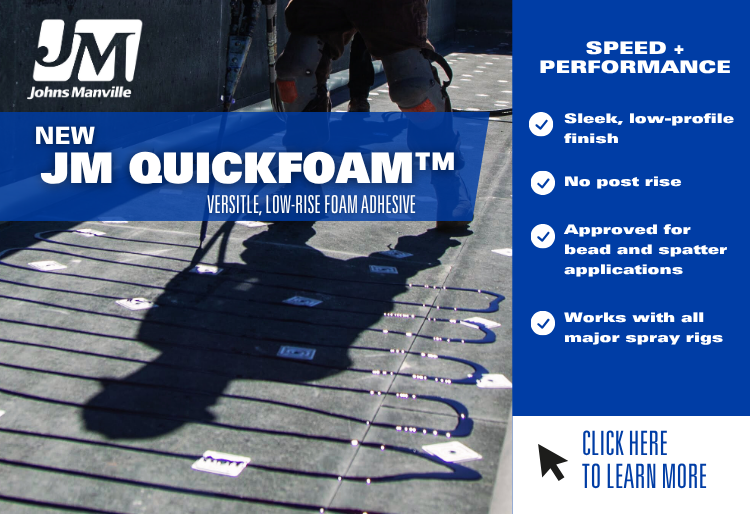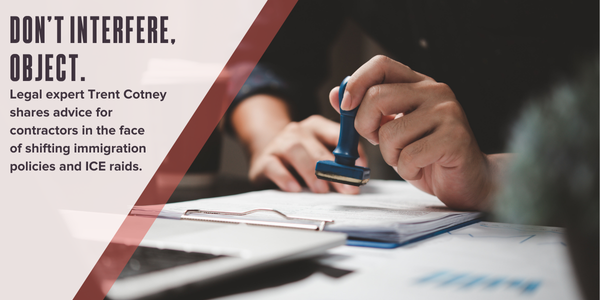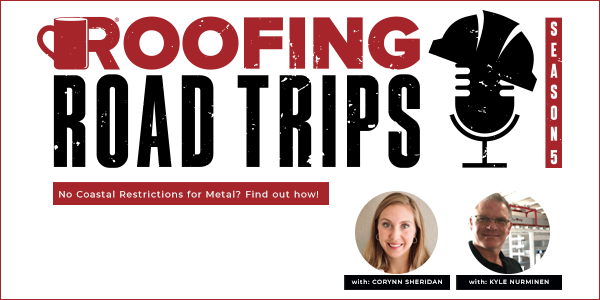Don’t interfere, object.
August 24, 2025 at 3:00 a.m.By Emma Peterson.
Legal expert Trent Cotney shares advice for contractors in the face of shifting immigration policies and ICE raids.
This year has seen a lot of changes when it comes to federal regulations and policies. To help you learn about what’s happening and how to navigate it legally, we sat down with Trent Cotney for a Coffee Conversations all about the latest legal issues impacting the roofing and construction industries. Trent is the partner construction team lead at Adams & Reese, which is a national law firm with over 100 lawyers on staff. He has over three decades of experience working with the roofing industry and volunteers his time as general counsel with leading roofing associations like the National Roofing Contractors Association (NRCA).
When asked what he thinks the top legal issue in the industry is at the moment, Trent brought up immigration. He explained, “Whether it's ICE raids, I-9 compliance, dealing with subs, understanding the variety of different issues that come up there, immigration is a huge conversation.” Trent’s advice? As always, have a standard operating procedure or a game plan in place. He elaborated, “You should have an internal operating procedure for if ICE shows up to either a project site or your home office, you should know exactly what to do and how to go about doing it. You want to remain professional and composed, but make sure and assert your rights.”
These rights can be as simple as the right to remain silent and the right to counsel. You also have the right to see the warrant being used to investigate under. There are two main types of warrants – administrative and judicial. Trent shared a bit about the differences between these two, saying, “An administrative warrant is a warrant that allows ICE to detain individuals that are on public property. Public property can be a sidewalk or it could be anywhere that is accessible by the public. So if I come to your home office and I can access your lobby, that's public area... A judicial warrant is a warrant that is actually signed by a judge and it allows them to access private property, or areas not publicly accessible.”
To make sure that the denotation between your public and private spaces is clear, you should be proactive in things like signage. Trent elaborated, “If ICE shows up to your home office and requests to access the warehouse area that is behind a locked door that says restricted access, signage is very important. So restricted access, private property, construction work site, all that kind of stuff, signals that it's private property that requires a judicial warrant.” And if ICE ignores that signage and continues? Trent says not to interfere, but to object. That means, “Don't block them, don't touch them, don't interfere with them, but object and make sure that you have a witness there to hear your objection.”
The key takeaway? Look at the warrant and make sure you have legal support. Trent explained, “If for some reason ICE shows up to your job site or your home office, you need to look at the warrant. You need to first determine is this an administrator or a judicial warrant? The next thing you need to determine is what does it say? Does it have the right address on there? If it doesn't, you should object. What I always recommend for any contractor is don't take the burden yourself, blame it on your lawyer. Say something like, ‘So I've looked at your warrant. What my lawyer has said is that this is not a judicial warrant, this does not give you the capability to go into this restricted access area. Therefore, I am objecting because I believe this is an improper search and seizure.’ Don't interfere. Just object.”
Read the transcript, Listen to the full conversation or Watch the entire episode to get more legal advice and insights from Trent Cotney.
Learn more about Adams & Reese LLP in their Coffee Shop Directory or visit www.adamsandreese.com.
The information contained in this article is for general educational information only. This information does not constitute legal advice, is not intended to constitute legal advice, nor should it be relied upon as legal advice for your specific factual pattern or situation.

About Emma
Emma Peterson is a writer at The Coffee Shops and AskARoofer™. Raised in the dreary and fantastical Pacific Northwest, she graduated in 2024 from Pacific University in Oregon with a degree in creative writing and minors in graphic design and Chinese language. Between overthinking everything a little bit, including this bio, she enjoys watching movies with friends, attending concerts and trying to cook new recipes.






















Comments
Leave a Reply
Have an account? Login to leave a comment!
Sign In